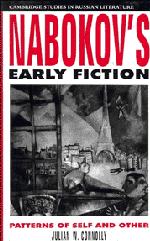Book contents
- Frontmatter
- Contents
- Acknowledgments
- List of abbreviations
- Introduction
- 1 The quest for the other
- 2 Altering the themes of life
- 3 The evil differentiation of shadows
- 4 A fondness for the mask
- 5 Dimming the bliss of Narcissus
- 6 The struggle for autonomy
- 7 The transforming rays of creative consciousness
- Notes
- Bibliography
- Index
- CAMBRIDGE STUDIES IN RUSSIAN LITERATURE
2 - Altering the themes of life
Published online by Cambridge University Press: 05 December 2011
- Frontmatter
- Contents
- Acknowledgments
- List of abbreviations
- Introduction
- 1 The quest for the other
- 2 Altering the themes of life
- 3 The evil differentiation of shadows
- 4 A fondness for the mask
- 5 Dimming the bliss of Narcissus
- 6 The struggle for autonomy
- 7 The transforming rays of creative consciousness
- Notes
- Bibliography
- Index
- CAMBRIDGE STUDIES IN RUSSIAN LITERATURE
Summary
Nabokov's fiction in the years 1927 and 1928 expands upon the principles established in his earlier work and offers further illumination into the potential consequences of an individual's obsession with another. In certain works of this period, though, the other who is the object of such attention is not absent, but present, and this “presence” causes a shift in the dynamic of individual fixation. The protagonists seeking a desired goal in their relationship with another attempt to manipulate or control the lives of those around them. This endeavor offers an early form of what later emerges as an overt authorial aspiration.
Nabokov does not yet focus on protagonists who consciously try to shed their status as characters and to attain the powers of an author, but his fiction raises the issue in subtle ways, particularly in the English version of King, Queen, Knave. The brief sketch “The Passenger” discusses the urge that some would-be authors have to mold experience into neat aesthetic packages; “An Affair of Honor” illustrates this impulse at work within the life of a particular individual; and King, Queen, Knave demonstrates how this urge can dominate the lives of a whole series of characters.
- Type
- Chapter
- Information
- Nabokov's Early FictionPatterns of Self and Other, pp. 45 - 74Publisher: Cambridge University PressPrint publication year: 1992



